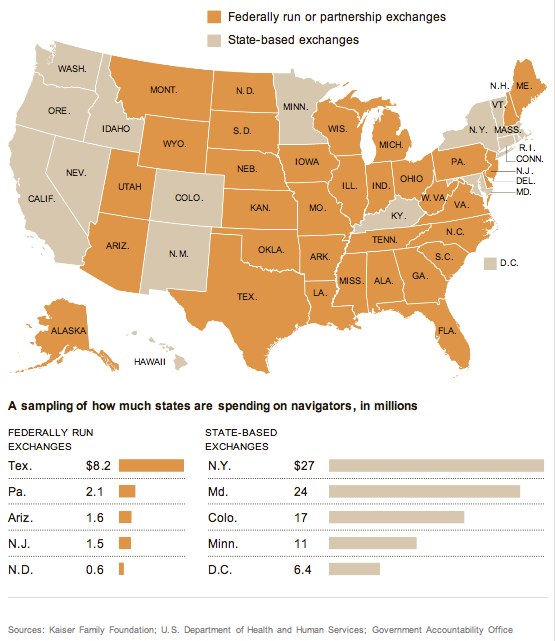THURSDAY TOP NEWS LINKS:
Becca Aaronson, Texas Tribune
With the rollout of many Affordable Care Act provisions fast approaching, the federal government announced Thursday that eight Texas organizations will receive a combined $10.8 million to hire and train “navigators” to help uninsured Texans find health coverage.
“Navigators will be among the many resources available to help consumers understand their coverage options in the marketplace,” U.S. Health and Human Services Secretary Kathleen Sebelius said in a statement. “A network of volunteers on the ground in every state – health care providers, business leaders, faith leaders, community groups, advocates and local elected officials – can help spread the word and encourage their neighbors to get enrolled.”

Along with many other provisions in President Obama’s signature health reform law, the individual mandate to purchase health insurance is set to take effect on Jan. 1. Individuals who land somewhere between 100 and 400 percent of the federal poverty line will be able to apply for sliding-scale subsidies through state health insurance exchanges that the federal government plans to launch on Oct. 1. The health plans offered in the exchange will become active on Jan. 1.
United Way of Tarrant County — in collaboration with 17 other organizations — will receive $5.8 million, the largest of the federal navigator grants awarded in Texas, to help enroll Texans in health plans offered through the federal health insurance exchange (Texas opted not to devise its own state-run exchange). East Texas Behavioral Healthcare Network will receive $1.3 million, the second largest grant, and six additional organizations will each receive between $376,800 and $785,000. In total, the federal government awarded $67 million to more than 100 organizations across the country. View the full list here.
The grant recipients will have a tight deadline — roughly five weeks — to hire and train navigators who can help individuals apply for coverage before the health insurance exchange launches on Oct. 1. Navigators must undergo 20 to 30 hours of training, pass a certification test and renew their certification annually, according to HHS.
Texas Attorney General Greg Abbott and 12 other states’ attorney generals have raised concerns that the federal navigator program could pose risks to patients’ privacy. In a letter sent to Sebelius on Wednesday, the state attorney generals assert that the federal government’s screening process does not require uniform background or fingerprint checks, therefore convicted criminals or identity thieves could become navigators. They also expressed concerns that navigators would not undergo sufficient training.
“We take very seriously the privacy of our states’ consumers and believe that your agency’s current guidance regarding these groups suffers numerous deficiencies,” the attorney generals wrote in the letter.
Some medical professionals have raised objections to the attorney generals’ concerns, suggesting they are politically motivated. They say navigators must comply with state and federal laws governing the privacy of sensitive medical information. If they do not adhere to strict security and privacy standards, including how to handle and safeguard consumers’ social security numbers and identifiable information, they are subject to criminal and civil penalties at both the federal and state level. The federal government imposes up to a $25,000 civil penalty for violating its privacy and security standards.
State lawmakers also approved Senate Bill 1795 in the 83rd legislative session, which authorizes the Texas Department of Insurance “to regulate navigators if it determined that federal standards did not ensure they were qualified to perform their duties or avoid conflicts of interest,” according to a legislative report. The new state law, which takes effect Sept. 1, allows the department to enact rules that protect patient privacy and prohibit navigators from accepting payments from health insurance companies or posing as an insurance agent.
The insurance department is still in the rule-making process and has not determined whether those provisions will be enacted before the exchange launches on Oct. 1.
(Originally published in the Texas Tribune)
RELATED COVERAGE:
- Non-profits get $10.8M to promote health care law (Austin Statesman)
- Abbott raises privacy concern with Affordable Care Act grants (Austin Statesman)
LOCAL AREA HEADLINES:
- CPS: Dad of abandoned baby wants to keep his son (KPRC 2 News)
- Next generation of physicians face uncertain future (KRIV 26 News)
- 5-year-old gets a flight of a lifetime through Make-A-Wish (KIAH 39 Newsfix)
- Selling Social Security Numbers (KRIV 26 News)
- Boil water order issued for Bolivar Peninsula area residents (KTRK 13 News)
- New president of Houston’s independent crime lab named (KPRC 2 News)
- Galveston named among best beaches in the nation (Chron.com)
- Happy Trails? The Battle Over a Bike Path and the Fate of the Texas AIDS Memorial Garden (Houston Press)
TEXAS HEADLINES:
- SBOE Will No Longer Approve Charter Applicants (Texas Tribune)
- Gulf Chemical settles state complaint for $7.5M (KRIV 26 News)
NATION & WORLD:
- Forecasters: Tropical Storm Erin should strengthen (Chron.com)
- High-profile task force backs path to citizenship (Austin Statesman)
- Pentagon issues new regulations aimed at combating sexual assault in military (Washington Post)
